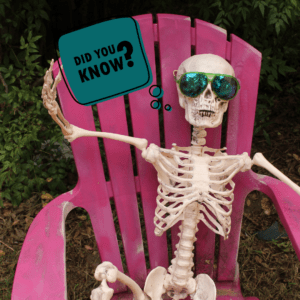There’s an old story about how if you hear ringing in your ears, someone’s talking about you 🗣.
And while you might be the subject of someone’s juicy gossip, it’s probably more likely that this is a very common condition called tinnitus!
This Tinnitus Awareness Week we’re taking the time to explain a little bit more about what tinnitus is and what you can do about it.
You might have heard of tinnitus already, as it’s quite common – about 15 to 20% of people experience tinnitus in their lifetime.
Here’s the information you need to start addressing this disruptive condition:
What is tinnitus?
Tinnitus is the name for perceiving or hearing noises or ringing in your ears 👂, however, they aren’t actually being caused by the outside world 🌍.
One thing’s for sure: it is quite annoying to put up with!
What are the symptoms of tinnitus?
Tinnitus involves hearing sounds when there isn’t any external sound present. This can include ringing, buzzing, roaring, clicking, whooshing, throbbing, hissing, or humming! 🎶
One thing’s for sure: it is quite annoying to put up with!
It can disrupt other aspects of life, making sleep difficult 🛌, causing fatigue 🥱, depression, and anxiety 😰, and can be associated with frequent headaches 🤕. This can really become very difficult and start to interfere with your ability to concentrate 🙇🏻♂️ or hear other external sounds properly.
Noises can really vary in pitch from low to high and you could hear it in either one or both ears. Tinnitus can also fluctuate, so it may come and go, or it can be there all of the time.
What causes tinnitus?
Tinnitus is usually not a condition itself but a symptom of some underlying issue like age-related hearing loss, an ear injury, exposure to loud noises, jaw problems, or another condition like diabetes, thyroid disorders, anxiety, or depression. It can also be a side effect of certain medications 💊.
Tinnitus can also be caused by more serious injuries to the head 🤕, in which case, please seek out the advice of your doctor in the first instance. It can also be the outcome of something much more simple, like an ear wax blockage 👂.
Either way, make sure you investigate with your doctor/ear nose and throat specialist for an assessment to understand the underlying cause of your tinnitus. Once we have a diagnosis there are many approaches you can take to help reduce your symptoms.
What can you do to help ease your tinnitus?
After seeking advice, start by trying the following:
– Take up some relaxation techniques 🧘♀️. You might try out some deep breathing, taking a nice long bath, a guided meditation, or yoga to help relax, as tinnitus can get worse with stress. Look for ways to reduce the stress you’re experiencing, and look into therapeutic options to manage mood if needed.
– Improve the quality of your sleep 😴. We can help with this! But make sure you have the basics down, by sticking to your bedtime each day and that you have a wind-down routine in place. Don’t bring any screens into the bed with you, and avoid caffeine or eating too late in the day. This may take some experimenting, but good quality sleep can help.
– Avoid listening to loud background noises 🤫. No blasting loud music at home or into your earphones! Keep the TV at a reasonable volume. You don’t need to have complete silence, either. Don’t be afraid to have soft music or sounds, as this can help distract from the tinnitus.
– Take your vitamins. Some studies have shown that a lack of B-12 vitamins can cause tinnitus in some people. It may not be a cure, but it can help to ensure you’re getting a solid intake of B-12, so make sure you have a good source of B-12 in your diet. If you are a vegan, look for fortified cereals or non-dairy milk, as well as supplements.
How can chiropractic and/or massage therapy help?
Chiropractic and massage therapy may help, depending on what has caused your tinnitus. Often tinnitus can be affected by jaw problems or can be made worse by tightness in certain muscles around the front of the neck that keep the ear channel open. Sometimes jaw tension or clenching can tighten the muscles which affects the Eustachian tube (namely, the canal that connects the middle ear to the upper throat and back of the nasal cavity). Gentle release of the jaw and relaxation of the neck muscles can help ease the tension that can worsen tinnitus.
First, seek out the advice you need to address the underlying cause of your problem, and then we will do what we can to help restore some much-needed peace and quiet in your life once again. We can get started together and turn down the volume on all that extra noise so you can get back to normal.





